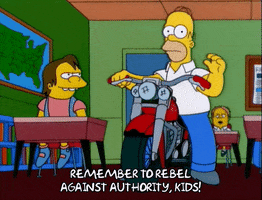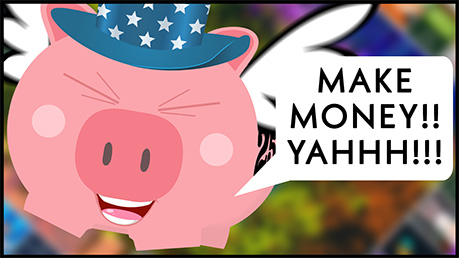PLAYTESTING A GAME (HUSTLE Playtest #1)
So last night...

I introduced my new girlfriend to my parents.
This is an emotionally accurate way of saying "I playtested THE HUSTLE for the first time."
Testing My Play-Tience
Enormous thanks and appreciation is owed to the Society of Play, who have created an amazing community for game developers to meet, collaborate, and find information and support.
They do not have a SoundCloud, so you will have to settle for their Patreon.
The game is currently local co-op only, but a friend recommended Parsec, a currently-in-beta (and free) system for playing local co-op games over the net. After about twenty minutes of ironing out bugs (on our end, not Parsec's) we were good to go.
I clicked start. And then the ghostly hands of other players across the Internet took hold of my computer and began to play my game.

The same Parsec friend suggested I say nothing during the playtest, which is excellent advice. And I have done things like this before, which is why I immediately forgot all of that and began emoting profusely.
I'm mostly joking.
I'm going to talk about "playtests" here because this is games, but I learned this doing test screenings of my own film / TV work. I think the basics should apply to both, and I'd be interested to know if/where you think it differs.
But the rule is pretty simple.
THE FIRST RULE OF PLAYTEST CLUB IS YOU DON'T TALK -
That's it. Don't talk.
The playtest is intended as a simulation of the audience's actual experience. And unless you usually play games with the developers mouth-breathing over your shoulder and sweating on your keyboard, the simulation is starting out buggy, and every extra word you say is just more sweaty mouth-breath in the perfectly clean simulation.

Games make testing even more complicated, in my opinion, because testing a game is like screening a movie, except the audience first has to figure out how to work the Blu-ray player on their own.
The short of "Don't Talk During Testing" is this:
- People are intensely influenceable.
- Their experience of art is significantly colored by the context in which they take in the art.
- Every word you say pollutes the simulation.
- People who might have problems with your game will give it extra mental points if you're charming - and you are so charming -
- - and they'll also deduct mental points if you're obnoxious.
- Almost none of this is intentional or conscious (in my experience).
- People will enter your game from their own point of view.
- If you leave the testing audience to their own devices, you will get a 4K-resolution picture of how the first moments of your game are speaking to them. Things you took for granted about affordances, mechanics, UI design will all come into startling clarity when players are unable to find the start button (NSFW).
- Audiences are at the same time way slower and way, way faster than you are, so this is your chance to figure out where you're outrunning them and where they're leaving you in the dust.
- People are intensely empathetic.
- For most people, hurting someone else's feelings is a nigh-physically painful process. It's not about you. It's about the part of their brain that can't stop simulating you, and it sends an electric wince down their spine every time they say something that they think would hurt your feelings.
- This is why one of the few things it is good to say is
- "You can't hurt my feelings."
- "No, really, you can't hurt my feelings."
- "Let me put it another way: every criticism you don't tell me now is one that 50 angry Youtube commenters are going to scream at me in all caps, and I'm pretty sure you can criticize my game without bringing my mother into it."
So we're clear on that? Talking during playtesting = ruining the entire purpose?
Fantastic.
Because now I'm going to tell you why I did talk during my first playtest -
- frequently -
- and how much that helped.
RULES WERE MEANT TO BE BROKEN*

* More specifically: rules were meant to be studied so as to understand the underlying conditions that they attempt to address, so that you can more precisely know when they should be applied, and when they should be ignored.
I started by saying very little, because it was the beginning of the game, and I needed to know just how janky my on-ramp was.
But once we got past that point, I did start talking, and here's why:
- I had to be the affordances.
- The game is in good shape, but it's still very raw. It may seem like a Monopoly knockoff, but there's actually a lot of things happening under the hood, and a lot of that - like the talent and charisma of Jon Batise - just exists, without calling attention to itself.
- This was a play test, not a tutorial test. So any time it seemed like "play" was getting hung up on unclear systems, I made a note and explained it.
- I am now in the process of buying a t-shirt that says "My friends call me 'Tool Tips!'"
- These were fellow gamedevs.
- They were down to talk about the game, and about what they liked and didn't like, and they could do it honestly and directly.
- They had lots of ideas, and I was down to steal them.
These are reasons enough, but the biggest reason I engaged with the players directly was because
- I needed the juice.
- I have been working on this game on nights and weekends since June. The game has both evolved and improved (I've added or torn out/replaced 5 major systems in the game, with another 2 coming in before we release)
- I spent my entire Christmas->New Year's break pushing out my "Seven Day Alpha."
- I am tired.
- Right now, I don't need real talk, I need real endorphins. I needed to get excited about people getting excited, and to selfishly roll in their excitement.
- Now I have a start on a reorganized list of "to do's," in the game, and the driving force is "more fun," not "avoiding embarrassment."
And here's the most important part: when the players were talking, I did my best to shut up.
Annnnd -

I'd say "really good," actually. How can I be sure the players liked it? As with boys and car salesmen, "ignore everything they say, and listen to what they do."
- Lots of laughing? Check.
- Players begin deal-wrangling and inhabiting their in-game personas using the game's mechanics/world? Check.
- I expected we'd play for 30-40 minutes - we went about 90.
- When we said, "Okay, last round and we're out!" - they played two more rounds.
- When we finally did wrap it up, they said they wanted to play again. Not "play another game sometime" but "continue playing this save game."
I'm taking all of these things, and my five pages of notes, and my newly found endorphins, and I'm going back to work.
I will leave Penny to give you the final words of advice.
The Hustle
Start from the bottom. Try not to die there.
| Status | In development |
| Author | AGuyNamedEdward |
| Tags | Board Game, Comedy, Funny, Local multiplayer, Multiple Endings |
| Languages | English |
More posts
- Computing Narratives from Player ActionsSep 11, 2021
- Like most gamedevs, I am addicted to scope creep.Sep 03, 2021
- I GOT NAME CHECKEDJan 20, 2021
- Introducing: PENNYDec 30, 2020

